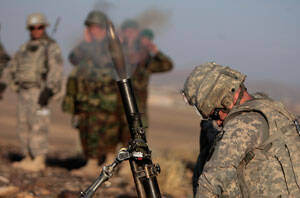President Barack Obama's goal of a "responsible transition" in Afghanistan must serve as the "overall ethical framework for U.S. actions" there, the chairman of the U.S. bishops' Committee on International Justice and Peace told the national security adviser. In a letter dated Dec. 18 to retired Marine Gen. James L. Jones, Bishop Howard J. Hubbard of Albany, N.Y., called for the development of "specific criteria" for troop withdrawal, as well as efforts to help the Afghanis "secure an adequate basis for future political and economic stability." He urged that "each course of action taken by the U.S." in Afghanistan be "weighed in light of the traditional moral principle of 'probability of success.' . . . In other words, will this action contribute to a 'responsible transition' and withdrawal as soon as appropriate and possible?" the bishop said. "Will it improve Afghan security and minimize loss of life? Will it provide an adequate foundation for long-term development?" Bishop Hubbard urged the Obama administration "to continually review the use of military force—whether and when force is necessary to protect the innocent and resist terrorism—to ensure that it is proportionate and discriminate, and to develop concrete criteria for when it is appropriate to end direct U.S. military involvement in Afghanistan." "The goal of a 'responsible transition' should be carefully defined and limited to permit a timely withdrawal," the bishop said. "But having initiated military action in Afghanistan, our nation must be committed to fostering good governance, respect for human rights and religious freedom, and economic and agricultural development long after direct military engagement ends."
Bishops Committee Backs 'Responsible Transition'
Show Comments (
)
Comments are automatically closed two weeks after an article's initial publication. See our comments policy for more.
The latest from america
This week on “The Spiritual Life,” Father James Martin speaks with former Secretary of Transportation Pete Buttigieg about faith, fatherhood and his “Jesuit background.”
In ‘Where is the Friend’s House?,’ we see the faces of the Iranian people captured with sensitivity and detail.
Among those recognized at two theology conferences in June was Stephen Bevans, S.V.D., to whom the Catholic Theological Society of America gave its highest honor, the John Courtney Murray Award.
“Keeping our gaze on Jesus, we must learn to give a name and voice even to sadness, fear, anguish, indignation, bringing everything into relationship with God,” Pope Leo said.








